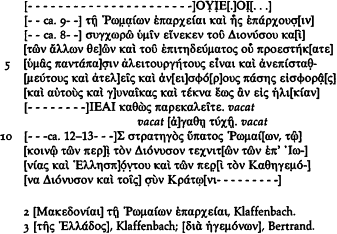D. On the Restoration of Sherk 44 = IG VII.2413, Lines 2-3
I offer a text of IG VII.2413/14, based on R. K. Sherk's edition (no. 44), with the revisions made recently by P. Roesch, and all questionable restorations removed to the apparatus criticus. I was unable to find the stone on three separate visits to the museum at Thebes in 1985-86. The date of the text remains, so far, uncertain, despite Roesch's arguments for Mummius as the author; the texts to be published by Ch. Kritzas (whom I thank for this information) may well support the view that Mummius was the author.[34]
We see at a glance that G. Klaffenbach's restoration of lines 2-3, inserting reference to the province of Macedonia and a strange reference to "rule" of Greece, far from being beyond discussion (so Accame), is quite unwarranted. J.-M. Bertrand puts it nicely: "La tradition érudite s'est abandonnée à une restitution de G. Klaffenbach aussi spectaculaire qu'injustifiable."[35] The restoration of proper names that do not appear elsewhere on the stone, and are not recommended by known formulae or certain parallels, is unacceptable epigraphic method. Such restoration certainly does not enjoy the status of evidence. But not only are the restorations uncertain; they are most unlikely.
[
] in line 2, certainly, does not belong. There is no parallel for the phrase . The Greek translation in Roman documents of the Latin Macedonia provincia was is never, to my knowledge, added.[36] We should not, therefore, imagine any proper name before . As Bertrand has observed, the author of the letter was, on this account, not (if we are to follow our parallels) speaking of a specific provincia .[37] Bertrand is doubtless correct to argue that is simply a form of a traditional Greek phrase meaning "the area over which X [in the genitive] holds sway."[38] This is its meaning in Polybius, a contemporary: when he writes that the Gauls in 299 attacked the Romans and (2.19.2), he is not speaking of a provincia but of territory controlled by Rome.[39] Assuming that our au-thor was indeed a Roman, the Latin counterpart of the phrase that would have lain behind the Greek would be imperium populi Romani or Romanum ; but the imperium could extend far beyond the provinciae .
Nor does [
] belong at the beginning of line 3. To begin with, the Greek is dubious. The problem is not so much that in line 2 lacks an antecedent ( or is often understood behind such expressions as : cf. Polyb. 21.43.15-16 [21.2.15-16 Loeb ed.]), but that the relative pronoun should be followed in such a clumsy way by the definite article and noun, which are equally awkward whether taken in apposition or as a partitive genitive. A passage in Polybius suggests that "that part of Greece that they rule" ought to have been , (n. 39)—hence, in our inscription, , which would have the additional advantage of maintaining parallelism in the use of the dative case. But this is excluded by what is extant on the stone.Second, a rough calculation from a photograph (the stone is lost, as noted above), which is based on the average size of the letters of line 3 and the reasonably certain width of the lines, shows that it is very unlikely that as many as ten full-width letters stood to the left of the preserved portion of this line. This makes [
], which has no iotas or other narrow letters, unlikely purely on grounds of space.Finally,
, with understood as the subject, would seem to be quite superfluous after . S. Accame explained away this apparent illogic as a sign that Greece was appended, rather than annexed precisely, to the province of Macedonia, but what this meant in practice is quite obscure. A distinction seems to be drawn between and ; perhaps therefore a subject for the defining clause other than was actually given.[40] is tempting and might just be squeezed in, but speculation is idle on this point.In sum, there are no parallels with which to restore the opening lines of IG VII.2413 with any kind of certainty, and until one emerges, it is useless to attempt restoration. What is certain is that this inscription is too fragmentary to be of any independent value in determining the status
of Greece from 146. The author of the letter evidently made some reference to the area of Roman control presumably the imperium Romanum , but we cannot base any major conclusions on this, since we do not know the context, nor do we know the subject of the verb
.


























